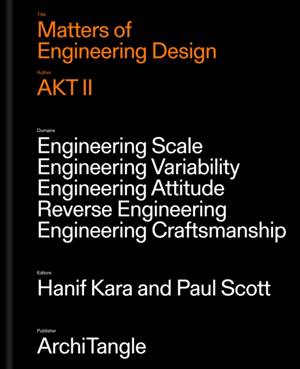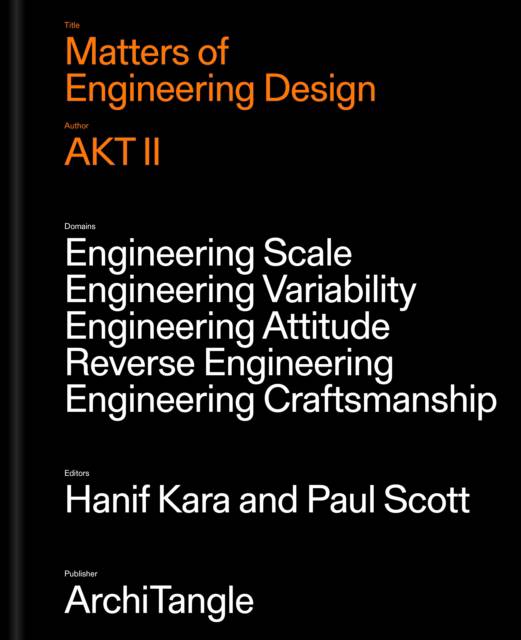
- Afhalen na 1 uur in een winkel met voorraad
- Gratis thuislevering in België vanaf € 30
- Ruim aanbod met 7 miljoen producten
- Afhalen na 1 uur in een winkel met voorraad
- Gratis thuislevering in België vanaf € 30
- Ruim aanbod met 7 miljoen producten
Zoeken
Matters of Engineering Design
Akt II
Stephen Parnell, Vicky Richardson, Ellis Woodman, David Basulto, William Baker, Jayne Kelley, Priya Khanchandani, Adrian Lahoud, Lesley Lokko, Ibrahim Mahama
Hardcover | Engels
€ 87,95
+ 175 punten
Omschrijving
Since the firm's founding twenty-five years ago, AKT II have forged an international practice that unifies the cultures and disciplines of architecture and structural engineering. This book is an engine for critical reflection on the scope, potential, and limits of what they have come to define as design engineering. Structured into five discursive domains-scale, variability, attitude, reverse engineering, and the craftsmanship of engineering-the book presents a robust selection of the firm's endeavours, which together demonstrate a vast range of encounters and processes in design. Common among them is a desire to understand and reshape the boundaries of the discipline of structural engineering, along with its links to fields such as philosophy, computer science, and geography. Interlaced with the projects, texts by contributors from varying fields engage the theoretical discussions and social conditions that bind contemporary practice. Matters of Engineering Design: AKT II balances structural concerns that require an equilibrium of internal and external forces, a clear understanding of boundary conditions, and knowledge of the properties of material with the overarching challenges that society faces today, including advances in technology, changing economic orders, and ecological responsibility. With contributions by William Baker, David Basulto, Hanif Kara, Jayne Kelley, Priya Khanchandani, Adrian Lahoud, Lesley Lokko, Ibrahim Mahama, Stephen Parnell, Vicky Richardson, and Ellis Woodman.
Specificaties
Betrokkenen
- Auteur(s):
- Uitgeverij:
Inhoud
- Aantal bladzijden:
- 336
- Taal:
- Engels
Eigenschappen
- Productcode (EAN):
- 9783966800211
- Verschijningsdatum:
- 22/10/2022
- Uitvoering:
- Hardcover
- Formaat:
- Genaaid
- Afmetingen:
- 297 mm x 246 mm
- Gewicht:
- 1800 g

Alleen bij Standaard Boekhandel
+ 175 punten op je klantenkaart van Standaard Boekhandel
Beoordelingen
We publiceren alleen reviews die voldoen aan de voorwaarden voor reviews. Bekijk onze voorwaarden voor reviews.








